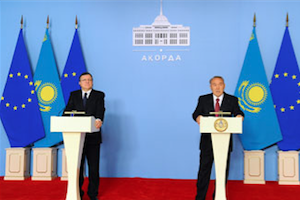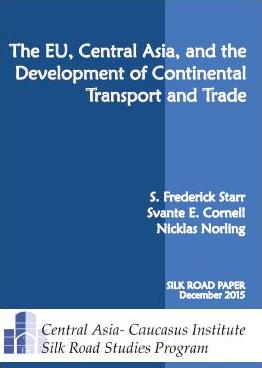The fallacy of ‘compartmentalisation’: the West and Russia from Ukraine to Syria
European View, June 2016, Volume 15, Issue 1, pp 97–109
Svante E. Cornell, The fallacy of ‘compartmentalisation’: the West and Russia from Ukraine to Syria
In the post-Soviet space as well as the Middle East, Western leaders have largely failed to heed ample evidence that the goals of the Russian leadership are fundamentally opposed to those of the EU and the US. Whereas Moscow seeks to counter Western influence and roll back the US’s role in the world, the West has proposed a win–win approach, seeking to convince Moscow that its ‘true’ interests should lead it to cooperate with the West. When this has not worked, Western leaders have ‘compartmentalised’, isolating areas of agreement from areas of disagreement. This approach has come to the end of the road because the assumptions that undergird it are false. So long as Western powers fail to understand the fundamental incompatibility of their interests with the deeply anti-Western interests of the current power brokers in the Kremlin, they are unlikely to develop policies that achieve success.
Svante E. Cornell is Director of the Central Asia-Caucasus Institute & Silk Road Studies Program, a Joint Center affiliated with the Johns Hopkins University’s School of Advanced International Studies and the Stockholm-based Institute for Security and Development Policy.
Turkiet är ett hot – inte en potentiell EU-medlem
Svenska Dagbladet, March 19, 2016.
Svante E. Cornell, Turkiet är ett hot – inte en potentiell EU-medlem.
EU borde akta sig för att knyta för nära band med Erdogans auktoritärt styrda Turkiet. Landet borgar inte för fred och säkerhet just nu. Tvärtom. Svante Cornell menar att det borde vara uteslutet att ens diskutera turkiskt EU-medlemskap medan hundratusentals kurder drivs från sina hem i sydöstra Turkiet.
Svante E. Cornell is Director of the Central Asia-Caucasus Institute & Silk Road Studies Program, a Joint Center affiliated with the Johns Hopkins University’s School of Advanced International Studies and the Stockholm-based Institute for Security and Development Policy.
Kazakhstan and Europe: Charting a Path to Progress

Kazakhstan and Europe: Charting a Path to Progress
Tuesday, Dec. 14, 2015, from 1 to 5:30 p.m.
On December 21 in Astana, the EU and Kazakhstan are slated to sign an enhanced Partnership and Cooperation Agreement. This development of closer EU-Kazakhstan relations, in a year when Kazakhstan also joined the WTO, takes place as Kazakhstan's economic and security situation is at a crossroads. Kazakhstan's region harbors considerable uncertainty, while falling commodity prices have forced the government to adjust its priorities, and spurred fundamental economic reform. Meanwhile, Kazakhstan is planning to host the Expo 2017 in Astana, and is promoting a bid for the 2017 UN Security Council.
Conference program:
13.00 - 13.30 Welcome and Introductory Remarks
Dr. Svante Cornell, Director, Institute for Security and Development Policy (click for video)
H.E. Dr. Dastan Yeleukenov, Ambassador of Kazakhstan (click for video)
H.E. Mr. Stefan Gullgren, Head of the Department for Eastern Europe and Central Asia, Swedish Ministry for Foreign Affairs (click for video)
13.30-15.15 Panel one: Kazakhstan and International Politics
Kazakhstan 2050: Vision for a New Century
Dr. Dauren Aben, Nazarbayev University (click for video)
Nuclear Non-Proliferation
Tariq Rauf, SIPRI
Kazakhstan's Bid for the UNSC
Dr. Johan Engvall, Research Fellow at ISDP and the Swedish Institute of International Affairs (click for video)
Beyond Oil: Astana Expo 2017 and Green Energy
Dr. Nygmet Ibadildin, Associate Professor, KIMEP University (click for video)
15:15 – 15:45 Coffee Break
15:45 – 17:30 Panel Two: Europe and Kazakhstan
Kazakhstan and Europe: Toward a New Partnership
Dr. Michael Emerson, Centre for European Policy Studies (click for video)
Relations with Europe in Kazakhstan's Foreign Policy
Dr. Askar Nursha, Project Coordinator, Institute of World Economy and Politics (click for video)
Kazakhstan: An Island of Stability in a Turbulent Region?
Mr. Vladimir Socor, Senior Fellow, Jamestown Foundation (click for video)
Advancing Continental Transport: the EU and Kazakhstan
Dr. Svante Cornell, Director, Institute for Security and Development Policy (click for video)
Location:
Sheraton Stockholm Hotel
Tegelbacken 6
10123 Stockholm, Sweden




